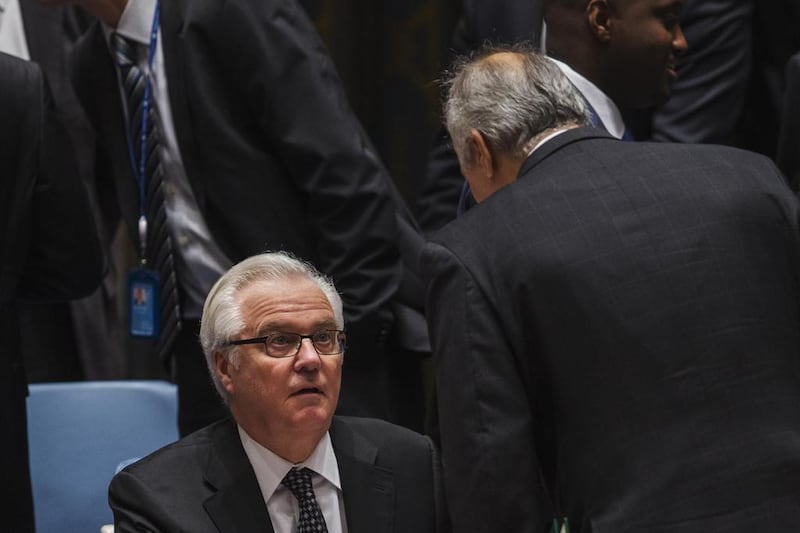NEW YORK // The Syrian opposition condemned Russia and China on Thursday for vetoing a resolution that would allow the International Criminal Court to investigate war crimes and crimes against humanity committed in Syria.
It was the fourth time Russia and China have used their veto power as permanent council members to deflect action against the government of Bashar Al Assad.
“Today’s vetoes by Russia and China represent a disgraceful attempt to shield from justice those responsible for war crimes and crimes against humanity,” said Najib Ghadbian, the Syrian National Council’s representative to the UN. “For the past three years, Russia has aided and abetted Syria’s war machine through the provision of deadly weapons. Now its priority is to ensure that the atrocities committed with these weapons go unpunished.”
Moscow is a close ally of Mr Al Assad and helped to broker the agreement with the United States that averted western military strikes against the regime in response to the worst chemical weapons atrocity in decades, which has been blamed by Washington on Assad’s government.
The chemical weapons agreement was in jeopardy on Thursday after Britain said Syria has made no progress in relinquishing a last batch of chemical weapons it says is inaccessible because of fighting, making it increasingly likely it will miss a final deadline to destroy its toxic stockpile.
The British deputy representative to the Organisation for the Prohibition of Chemical Weapons told delegates in that packaging material had arrived for the 100 metric tonnes of toxic chemicals.
“But there is still no sign of any movement of chemicals, nor any indications of a time scale for a move.”
Western countries have tried in vain to bring a diplomatic end to Syria’s three-year civil war, which has killed more than 150,000 people and displaced millions.
Thursday’s French-drafted resolution would have referred Syria’s crisis to the world’s permanent war crimes tribunal without specifically targeting either the government or the opposition.
Before the vote, the UN deputy secretary general Jan Eliasson pleaded with council members to find unity and “put an end to this long nightmare.”
The French Ambassador Gerard Araud warned, “A veto would cover up all crimes. It would be vetoing justice.”
There were 62 co-sponsors of the resolution, which was put to a vote knowing it would be vetoed.
The Russian ambassador, Vitaly Churkin, walked into the council meeting with a smile, telling reporters, “I’m going to be boringly predictable.”
The Security Council has been deeply divided over Syria, with Syrian allies Russia and China at odds with the US, its Western allies and other members who support the opposition.
Frustration has soared as the international community struggles to find a solution to the war, deliver humanitarian aid to almost 3.5 million Syrians in need and end impunity for horrific crimes. Attempts at peace talks are at a standstill, leading the joint UN-Arab league envoy who tried to broker them to resign.
“Today, China has chosen to place loyalty to Russia before the interests of justice. We hope that in the future China will exert greater independence in defining its own foreign policy priorities at the Security Council,” said Mr Ghadbian, of the SNC.
The draft resolution condemned the “widespread violation” of human rights and international humanitarian law by Syrian authorities and pro-government militias as well as abuses and violations by “non-state armed groups” during the past three years.
The ICC prosecutor cannot investigate the situation in Syria without a referral from the 15-member Security Council because Damascus is not a member of the Rome Statute that established The Hague-based court a decade ago. The Security Council has previously referred Libya and Darfur, Sudan, to the ICC.
UN investigators said in March that they had expanded their list of suspected war criminals from both sides in the civil war and that the evidence was solid enough to prepare any court indictment.
Navi Pillay, the UN human-rights chief, told the Security Council last month that human rights violations by Syrian government forces “far outweigh” those by armed opposition groups.
Although the United States is not a party to the ICC, it agreed to support the draft resolution after ensuring that Israel would be protected from any possible prosecution at the International Criminal Court related to its occupation of the Golan Heights in Syria, UN diplomats said.
Israel captured the Golan Heights from Syria in a 1967 war and annexed the strategic plateau in a move the world has not recognised. Syrian troops are not allowed in an area of separation – monitored by UN peacekeepers – under a 1973 ceasefire formalised in 1974.
Eleven countries on the Security Council are members of the International Criminal Court. Like the United States, Russia, China and Rwanda are not.
* Reporting by Taimur Khan in New York, Reuters and Associated Press





